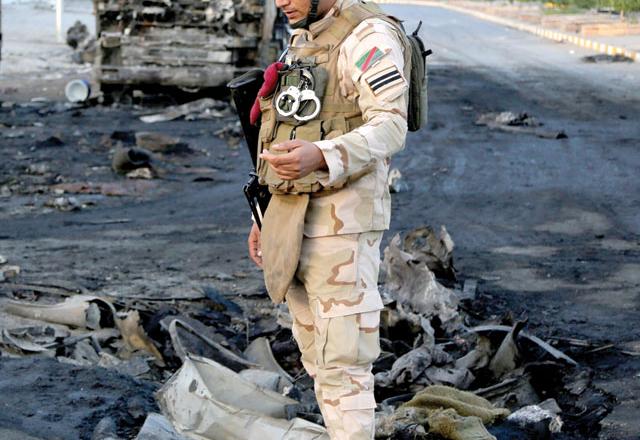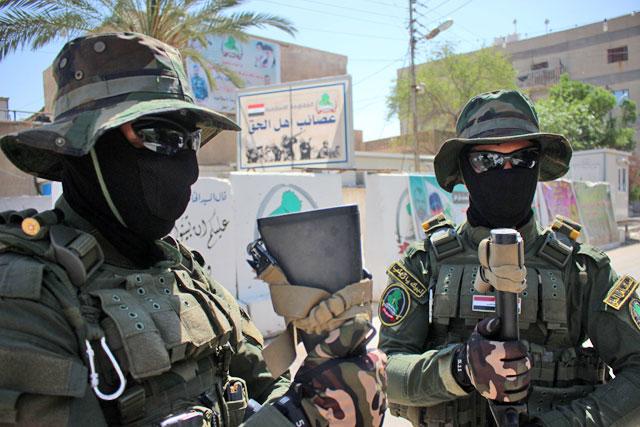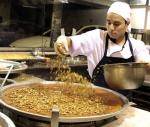You are here
Iraqi MP killed in suicide bombing claimed by IS
By AFP - Oct 14,2014 - Last updated at Oct 14,2014

BAGHDAD — An Iraqi MP and prominent militia leader was one of at least 21 people killed on Tuesday in a suicide bombing immediately claimed by the Islamic State jihadist group.
Ahmed Al Khafaji, a commander in the Shiite Badr militia, was killed in the attack in the Kadhimiyah area of Baghdad, a fellow lawmaker and a medical official said.
The bombing, which wounded at least another 51 people, was the third in the Shiite district of Kadhimiyah in four days.
In a statement posted online, the Islamic State (IS) said that a suicide bomber it identified as Abu Aisha Al Samarraie had carried out the attack and that Khafaji was the target.
A Shiite MP said that Khafaji was killed in the attack.
"We have confirmed that he was killed, although it is not yet entirely clear whether he was the target of the attack," the MP told AFP.
A medical official also said Khafaji was among the 21 people killed in the explosion.
Khafaji was a member of the main Shiite bloc in parliament, the State of Law coalition, of which Prime Minister Haidar Al Abadi’s Dawa Party is also part.
But he was best known as a top leader of the Badr organisation, which is one of the main Shiite militias in Iraq and has close ties to Iran.
The death of the Badr commander is the second high-profile killing in three days by IS, which also claimed an attack that killed the police chief of Anbar province on Sunday.
The Badr organisation was created in the 1980s with Tehran’s backing to fight the regime of executed former president Saddam Hussein.
It is currently headed by Hadi Al Ameri, a former transport minister whose declared candidacy for the as-yet-unfilled interior and defence portfolios has raised concern at home and abroad.
Badr plays a frontline role in Baghdad’s military efforts to fight back against IS and try to reclaim some of the land lost when the jihadists launched a devastating offensive in June.
Badr has for years been accused of a litany of abuses, including executions and abductions targeting the Sunni Arab minority in Baghdad and elsewhere.
Militia power
The organisation is one of the four main Shiite militias in the country.
While they have ranks of up to several tens of thousands of fighters and are integrated in government operations, they act outside the law.
“They can look and operate like regular armed forces but are not regulated by any laws or subject to oversight and accountability mechanisms,” Amnesty International said in a report issued Tuesday.
The report, titled “Absolute Impunity: Militia Rule in Iraq”, said that execution-style killings and sectarian attacks carried out in the name of revenge against IS amounted to war crimes.
“By granting its blessing to militias who routinely commit such abhorrent abuses, the Iraqi government is sanctioning war crimes,” said Amnesty’s Donatella Rovera.
On Monday, at least 43 people were killed in triple bombings in Baghdad, including one on the edge of Kadhimiyah also claimed by IS.
The jihadist organisation claimed another of those attacks, saying one of its Saudi followers detonated a suicide car bomb packed with 650 kilogrammes of explosives in the Sadr City neighbourhood.
Kadhimiyah, a district home to one of the holiest shrines in Shiite Islam, was also one of two areas targeted in double bombings that left more than 40 dead on Saturday.
The United Nations said more than 1,110 people were killed in acts of violence across Iraq in September. According to an AFP count, more than 350 have already been killed this month.
While the bloodshed has been mainly on the frontlines where federal, Kurdish and allied forces — including Shiite militias — are battling IS, blasts and executions in Baghdad continue to take a heavy toll.
Most of the major suicide bombings in Baghdad are ascribed to IS, but some of the smaller bomb attacks and assassinations are carried out by other more marginal Sunni groups and by Shiite militias.
Related Articles
BAGHDAD — Bomb blasts killed at least 24 people in one of Baghdad's main Shiite neighbourhoods Saturday when three suicide attackers tried t
BAGHDAD — A suicide bomber attacked a security checkpoint in northern Baghdad on Sunday, killing at least 14 people, Iraqi officials said.Th
Shiite militias converged on Ramadi Monday to try to recapture it from jihadists who dealt the Iraqi government a stinging blow by overrunning the city in a deadly three-day blitz.













